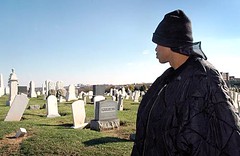Where is the outrage?
Within the last few days I read an article, a letter to the editor, or an editorial commenting about the continued murders in DC, with a query about where is the outrage? This article, about four recent murders, is one of the articles I read, "Typical Homicide Victims, Distinct Lives: Night of Four D.C. Slayings Has Shocked Relatives but Alarmed Few Others."
Certainly, I have let some of my outrage reign, having been particularly vocal in 2001 and 2002 about the sales of alcoholic beverages, the overconcentration of sales establishments in troubled neighborhoods, and the definite link to disorder. One of the articles I referenced in testimony before City Council was this one: Spatial Dynamics of Alcohol Availability, Neighborhood Structure and Violent Crime.
 Antonio Henry, 17, a high school senior, thinks often of his best friend, who was shot and killed. Henry and other youths went to Baltimore Cemetery as part of a program to teach them that if they stay in the streets, it could happen to them.(Sun photo by Chiaki Kawajiri) Nov 17, 2005
Antonio Henry, 17, a high school senior, thinks often of his best friend, who was shot and killed. Henry and other youths went to Baltimore Cemetery as part of a program to teach them that if they stay in the streets, it could happen to them.(Sun photo by Chiaki Kawajiri) Nov 17, 2005But the issue really is one of behavior, taking as a given the negative impact of poverty and distressed neighborhoods. E.g., check out these articles from the Baltimore Sun: "On a mission to halt epidemic of killings;" and "Doctor decries violent culture: Surgeon says 'slave mentality' leads to low achievement in young black males." From the latter article:
Black doctors have a special responsibility to speak out against the "culture of violence" and anti-intellectualism in America that encourages failure in young black men, a prominent physician told a conference of medical students yesterday. "You all are on the pathway to becoming dominant people, and you can change the culture," Dr. Edward E. Cornwell III, chief of adult trauma at Johns Hopkins Hospital, told an audience of about 150 minority medical students at the school of medicine.
"The culture of violence is the current health emergency. And it's not just that, it's the culture of nonachievement that says studying is 'acting white,'" said Cornwell, an African-American. That's a slave mentality to be a nonachiever because it's 'acting white.' It's not polite to say that, but changing the culture isn't going to be polite." Cornwell, a professor of surgery who operates daily on gunshot victims in East Baltimore, was a featured speaker at a conference called "The Missed Education: Examining the Shortage of Minority Men in Medicine."
Similarly, the discussion of hip-hop culture, the culture of violence, etc. sometimes misses the point. I don't think it's hip-hop that's the issue, but the elevation of "street" culture over "middle-class" culture, as described in the book Code of the Street by University of Pennsylvania professor Elijah Anderson (see Code of the Street video intro and here for a review of the book in the NYT as well as the first chapter).
I think that in the time since Code of the Street was published, perhaps a "tipping point" has been reached, as demonstrated by the predominance of "hip-hop culture," particularly the glorification of criminality in a goodly proportion of the music.
As a homicide detective pointed out in a letter published in the Post last week, most murders are about "business" or crimes of passion that end up in murder. Neither type can be addressed by policing, it's really about the culture of violence.
Index Keywords: public-safety



0 Comments:
Post a Comment
<< Home